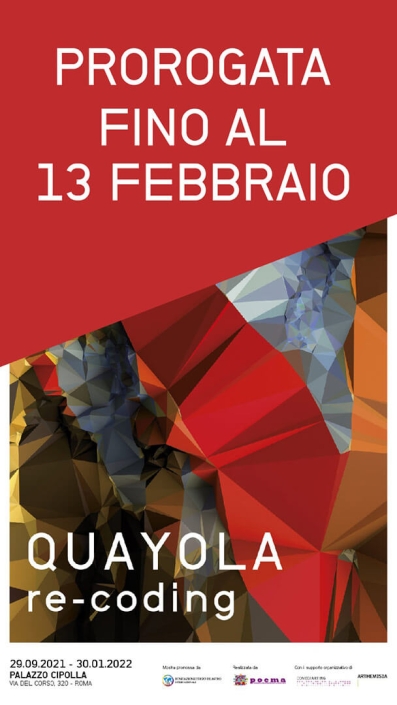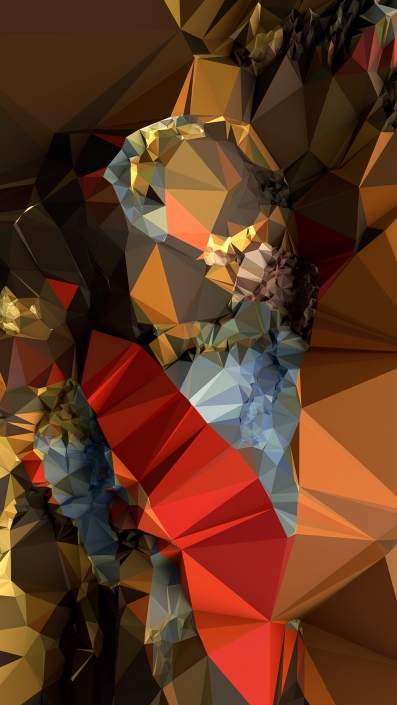QUAYOLA re–coding
At the crossroads between digital technology and immersive itineraries, from 29 September Palazzo Cipolla will be hosting the technological and generative art of Quayola, one of the leading international representatives of media art.
From 29 September Palazzo Cipolla in Rome will be hosting the first monographic exhibition of Quayola (1982), a Roman-born, London-based artist who is among the world’s leading representatives of media art.
Palazzo Cipolla is an ideal setting for Quayola’s art, which has always been marked by the constant interplay between Classical education and the everyday use of futuristic visual media.
The exhibition spans almost the whole of the artist’s career, featuring works executed between 2007 and 2021 in an immersive itinerary exploring the very essence of his computational art. The exhibition project unfolds across three thematic areas: Classical iconography, unfinished sculptures, and the tradition of landscape painting.
By employing robotic artificial intelligence systems and strings of generative code, Quayola reinterprets art history according to a new perspective, based on the use of an innovative language that reflects his poetic view of the digital world. The artist explores the endless possible ways of formalising creative ideas through the manifold opportunities that technology affords him. The research process thus becomes the very basis of each artwork.
Quayola does not use algorithms merely to create artworks, but provides essential instruments to interpret contemporary society. Renaissance and Baroque paintings are turned into complex digital compositions through computational methods, and sculptures inspired by Michelangelo’s technique of the unfinished are sculpted by robotic means. We then find representations of nature, the outcome of a generative art that highlights the fascinating – yet paradoxical – resemblance between the natural and the digital world. By developing a body of works that take on both immaterial forms (e.g. videos) and material ones (e.g. prints and sculptures), the artist sheds light on the paradox of immateriality, which is de facto a new form of materiality.
The exhibition is promoted by Fondazione Terzo Pilastro – Internazionale, headed by Prof. Emmanuele F. M. Emanuele. It is produced by Poema with organizational support from Comediarting and Arthemisia, and is curated by Jérôme Neutres and Valentino Catricalà. It is perfectly in keeping with the kind of events that the exhibition venue of Palazzo Cipolla has now been hosting for over twenty years. From the very start, with remarkable sensitivity and far-sightedness, the Foundation – under the competent leadership of its President – has focused on exploring the most significant artistic tendencies and forms of expression. This exploration began with a necessary investigation of those ages that have shaped Italian identity (the Quattrocento and the Baroque); it then continued with research on distant cultures (imperial China, Japan, India, Soviet Russia, and the United States), before touching upon the most relevant examples of Italian and international contemporary art, by highlighting its innovative ideas and undisputed protagonists (e.g. Rockwell, Hopper, and Banksy).
Quayola has exhibited his works in prominent international venues, such as the V&A Museum in London, the Park Avenue Armory in New York, and the Palais de Tokyo in Paris. He has taken part in several Biennials, including that of São Paulo, and in numerous festivals, such as the Sundance Film Festival of Park City. He has received a number of prestigious awards, such as the Golden Nica at the Ars Electronica Festival.
IMAGES AVAILABLE FOR DOWNLOAD FROM https://bit.ly/QUAYOLA_ROMA
Press Office
Fondazione Terzo Pilastro – Internazionale
Raffaella Salato
rsalato@fondazioneterzopilastrointernazionale.it | T. + 39 06 97625591
Arthemisia
Salvatore Macaluso
sam@arthemisia.it | M. +39 392 4325883
press@arthemisia.it | T. +39 06 69380306 | T. +39 06 87153272
STAGES
ITALY. Rome, Cipolla Palace, 29 September 2021 – 1 January 2022
Extended until February 13, 2022




